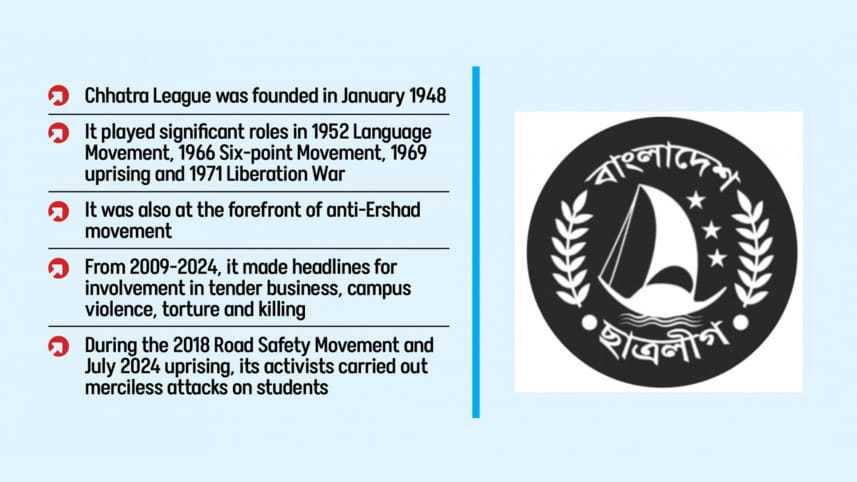Chhatra League banned

The interim government last night banned Bangladesh Chhatra League amid demands from the student movement against discrimination.
The home ministry issued a gazette notification with immediate effect, stating that the government invoked the Anti-Terrorism Act-2009 to ban BCL, a 76-year-old pro-Awami League student organisation.
The move comes a day after the students issued an ultimatum to the government, saying that they will take to the streets unless the BCL was banned within this week.
Several hundred students demonstrating in front of the Dhaka University vice chancellor's office cheered as the news of the ban came.
The AL, BCL and a leftist party leader condemned the move.
Abdul Kader, a coordinator of the student movement, announced near the TSC that students would march and distribute sweetmeat on university campuses across the country in celebration at 3:00pm today.
According to the gazette, the government made the decision as per section 18 (1) of the Anti-Terrorism Act-2009 and listed the BCL as a banned entity.
The section reads: "For the purposes of this act, the government, on reasonable grounds that a person or an entity is involved in terrorist activities, may, by order, enlist the person in the schedule or proscribe the entity and enlist it in the schedule."
There is evidence that the BCL has been involved in different conspiratorial, subversive and terrorist activities against the state since the fall of the AL government on August 5, reads the notification.
It adds that the BCL, a "brotherly" organisation of AL, was involved in activities that go against public security; the crimes include murder, torture, and oppression of students at dorm rooms informally known as "gono rooms". A large number of students stay in cramped conditions in such rooms.
The BCL took money for dormitory rooms, manipulated tender, raped and sexually harassed women, and committed other crimes after the country's independence, particularly in the last 15 years of the AL's autocratic regime, it adds.
Information and evidence of these crimes were widely covered by the media. Involvement of some BCL leaders and activists in criminal activities were proved at courts too, it says.
During the student movement in July this year, BCL leaders indiscriminately attacked protesting students and the general public, killing hundreds and endangering the lives of many others, the notification adds.
"Bangladesh and Dhaka University are now free from stigma. We would like to thank the interim government," said Nusrat Tabassum, a coordinator of the student movement, at Raju Sculpture of the university.
Last night, Mujahidul Islam Selim, former president of the Communist Party of Bangladesh, said the BCL men who committed crimes should have been identified and brought to justice instead of the ban on the organisation.
"Will banning Chhatra League bring any good? No. These people will start getting public sympathy even though they were hated by people for their terrorist activities," he told The Daily Star.
Ensuring the rights of all the students would have been more effective, he said.
History says an organisation cannot be abolished in this way because a legal ban is an expression of weakness, he said.
Founded in January 1948, Chhatra League played significant roles in the country's Liberation War, the Language Movement in 1952, the Six-Point Movement in 1966, the 1969 Mass Uprising, the AL's election victory in 1970, and the ouster of HM Ershad in 1990.
Bahauddin Nasim, joint general secretary of the AL, condemned the interim government, saying that the ban on BCL is an attack on the spirit of Liberation war and the constitution.
"This government is illegal. It has no constitutional foundation. How can it ban an organisation like Chhatra League that played a vital role in the Liberation War and all other democratic movements before and after the country's independence? Chhatra League is an organisation of this land and will continue to be so in the days to come," he said.
Notwithstanding its glorious past, the BCL started to draw widespread condemnation for its activists and leaders' activities after the AL came to power in January 2009.
In April that year, Sheikh Hasina, who was the organisational leader of the BCL, resigned from the post, expressing disappointment about BCL's unruly activities.
BCL leaders engaged in violence, mostly to make money through tender manipulation, extortion, and dominance over university campuses.
In 2012, BCL activists hacked a 24-year-old tailor named Biswajit Das to death. Other chilling crimes include the murders of Buet student Abrar Fahad in 2019, Jahangirnagar University student Zubair Ahmed in 2012, and Dhaka University student Abu Bakar Siddique in 2010.
BCL wrongdoings drew so much criticism that Sheikh Hasina removed its president and general secretary -- Rezwanul Haque Chowdhury Shovon and Golam Rabbani -- from their posts in 2019.
The organisation played repressive roles during the widespread protests for safer roads and reforms to quotas in government jobs in 2018.
Late last night, BCL President Saddam Hussain, and General Secretary Sheikh Wali Asif Enan issued a statement via WhatsApp, rejecting the ban and terming it illegal and unconstitutional.
The blood of BCL leaders and activists is in every inch of this country, it said, adding that the government should immediately step down.



 For all latest news, follow The Daily Star's Google News channel.
For all latest news, follow The Daily Star's Google News channel.
Comments